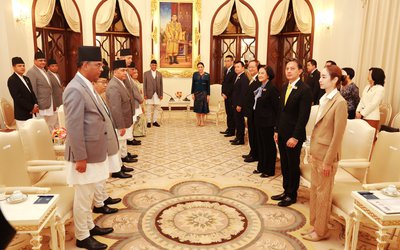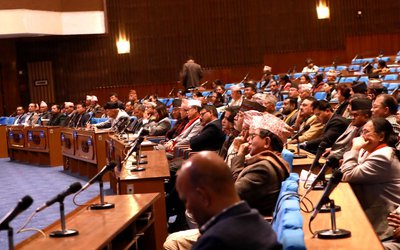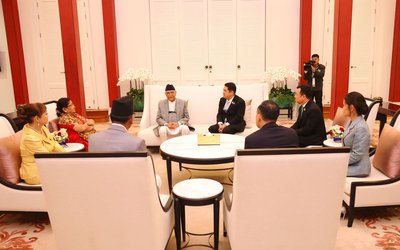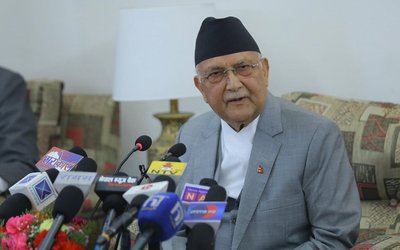More on News





A few weeks ago, UN country representative Robert Piper invited leaders of ethnic groups for an exchange of views. The meeting discussed the place and rights of ethnic groups, among other issues, under the new constitution. There were angry outbursts against the 'non-ethnic groups', mainly the Bahuns and Chhetris. Some said ‘we are the actual aboriginals' and the Bahuns and Chhetris are outsiders.
It is not yet known whether Dr Piper had these claims verified through cultural and historical evidences, or if at all he invited anthropologists to give more authentic versions of the claims that his guests in that particular meeting raised. But the UN and diplomatic system, with some honorable exception, have miserably been linked with the political and constitutional failure looming large in the country.
Each and every community, ethnic group, territorial group and individual minority have their own grievances, real or perceived, and most of them tend to blame the state for that. But neither the government nor the research groups have done any independent work into these aspects. Maoists succeeded in fuelling these grievances by projecting the monarchy, the unitary system of governance and the Hindu religion -- and Hindu groups like Bahun, Chhetris and Newars dominating the state affairs -- as the root of these grievances.
They took the help of the diplomatic community, church apart from some militant ethnic groups, to destroy what they thought were the strength of the ‘old regime'. After all, Maoists always believed that demolition of the old state was absolutely essential to build ' a New Nepal', a progressive Nepal. The reference to Church activities is necessary as aligning with certain militant political groups cannot be listed as religious or philanthropic activities. That may even trigger a conflict between various religious, communal or ethnic groups in the future. Besides, the UN, international donors as well as the diplomatic community have also been supporting the anti-state activities and forces.
Maoist leaders have miserably failed the country and the people. They have been able to inject social and communal hatred. Nepali society's legacy as a 'culturally, socially and religiously tolerant' practitioner is on the wane. That's where right thinking Nepalese expect UN and the diplomatic community not to fuel caste, ethnic and social divisions. UN can help promote and protect the right of socially, culturally and historically marginalized, but it cannot be the judge to decide who fall into such category based on one sided or lopsided versions. The UN is expected to foster expanded version of identity based on citizenship and human rights and promote a sense of belonging to the state.
The UN system in Nepal has come not only under criticism, but also under disrepute because of some of the major aberrations in discharge of its international obligations towards a member state. That largely begins with the arrival of Ian Martin as Special Representative of the United Nations Mission to Nepal (UNMIN) in 2007 and his subsequent activities. It was followed by open advocacy of ethnicity based federalism by CCD, a UNDP funded project. Constitutional expert like Prof Yash Ghai employed by the UN to advise on constitution making openly engaged in denouncing certain caste groups in Nepal, something that was not part of his job. The attitude of the people associated with the UN will eventually trigger a debate: Is UN a party, a dictator or a facilitator? Loss of UN’s credibility or respect in a conflict stricken society or country will have larger and long term implications to all those who believe UN has a larger and respectable role to play in the globe.
Having a credible international agency, preferably the United Nations, as a mediator was part of the 12-point agreement that brought UNMIN and Ian Martin in Nepal, although the role assigned to them was much smaller than planned earlier. Yet, Martin did not conceal his ambition to get involved in Madhes issue also when agitation began there for more rights and autonomy to the region. He took full advantage of the prevailing euphoria, and sided with the new actors, especially the Maoists, on many occasions. Civil society leaders like Devendraraj Pandey and Shyam Shrestha went on record saying if the 'People’s Liberation Army' was not there, the Nepal Army--in their words, the king's army--would have finished every political party and its leaders opposing the king. Martin picked up the thread from there.
Now, the Young Communist League (YCL) and disqualified Maoist combatants are up in arms against Maoist Chief Prachanda demanding that they be given similar treatment (including financial benefits) like the combatants 'voluntarily retiring' and getting into the army. It is also revealed now that at least three thousand combatants were loaned to the YCL. This could not have taken place without the knowledge of Ian Martin and G P Koirala, hero of the peace process and Prime Minister between 2006 April and August 2008, as well as Krishna Sitaula, the Home Minister and the most trusted aide of G P Koirala then. Some of the civil society leaders must have had the reason to feel happy about it, but Martin was not only wrongly briefed, he acted wrongly and objectionably. Moreover, both Koirala and Sitaula had been told by a person no less than Prachanda and Baburam Bhattarai that the number of combatants was less than 8,000, but neither G P Koirala or Sitaula, nor any one else, raised the issue when 32,000 plus appeared for verification and 19,000 plus were certified as 'qualified' combatants. It was clearly a well designed understanding to inflate the number of combatants to terrorize the --other army--the king's army.
There are many lessons that could be learnt from history that using terrorism as a means for political change may be possible, but it would always be difficult, if not impossible, to dismount from that horse without sustaining major injuries. Prachanda faces that predicament as YCL cadres accuse him of betraying them in pursuit of his political ambition. Maoists, especially the YCL, will no doubt have the mattter settled, as Prachanda has to be answerable, and there is no other escape route for him.
But the UN system in Nepal needs to respond to many of the allegations that are being directed against it. A failure to do so will only contribute to larger opinion, mainly in the third as well as the conflict stricken countries, against the UN system.






